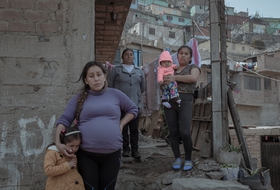
One in three women have suffered physical or sexual violence. With contributions from Europe, Africa, Asia and Latin America, we look at how this shadow pandemic affects every corner of the world.
Piplantri, a small Indian village located in the north-western Rajasthan State, celebrates female newborns with planting trees. It is a countertrend compared to the Indian subcontinent, where the birth of a girl child is generally considered anything but a blessing. Due to prenatal ultrasounds, able to indicate foetus’ gender, millions of female
Piplantri, a small Indian village located in the north-western Rajasthan State, celebrates female newborns with planting trees. It is a countertrend compared to the Indian subcontinent, where the birth of a girl child is generally considered anything but a blessing.
Due to prenatal ultrasounds, able to indicate foetus’ gender, millions of female unborn didn’t come into the world because their mothers underwent – sometimes being forced – selective abortions.
Piplantri is the symbol of females’ new life in India. Since 2007, Piplantri’s villagers have been planting 111 trees for each female newborn, whose family must take care of these plants until the girl reach majority.
The community, composed of 8,000 inhabitants, deposit a total of 21,000 rupees (300 euros) for each girl child born, added to 10,000 rupees given by her parents.
Shyam Sundar Paliwal is the villager who started the practice in memory of his young daughter passed away in 2007.
Socially and environmentally speaking, the initiative achieved significant results.
About 1.5 million trees have been planted over 6 years: they made the village greener and requalified deforested areas, and they allowed an easier access to water (now available only 3 metres underground, compared with the previous 200 metres). The planting programme also gave professional opportunities to many people; it improved families’ conditions, and allowed the extraction of medicines. The perception of the female figure has positively changed, and crimes dropped.
Today, many villages followed the example of Piplantri, by planting trees, whilst enhancing female figure.
The new life of the Indian women begins in Piplantri.
Siamo anche su WhatsApp. Segui il canale ufficiale LifeGate per restare aggiornata, aggiornato sulle ultime notizie e sulle nostre attività.
![]()
Quest'opera è distribuita con Licenza Creative Commons Attribuzione - Non commerciale - Non opere derivate 4.0 Internazionale.
One in three women have suffered physical or sexual violence. With contributions from Europe, Africa, Asia and Latin America, we look at how this shadow pandemic affects every corner of the world.
The Istanbul Convention against gender-based and domestic violence marks its tenth anniversary. We look at what it is, who its signatories are, and what the future might hold.
European Commission President Ursula von der Leyen reminded us of the gravity of violence against women around the world, and of the Istanbul Convention’s utmost importance.
President Erdoğan has pulled Turkey out of the Istanbul Convention, key in the fight against gender violence, claiming that it favours the LGBT community rather than family values.
Violence against women in Peru has increased as a result of Covid-19 lockdowns. 14,912 people were reported missing from January to November 2020, more than half of them minors and 64 per cent women. People have been confined to their homes for months, many forced to endure poor physical, economic and social conditions. A situation that
Joys Estefani Qqueccaño Huamani, 24, disappeared from her rural community in Peru on 9 October. Her family began looking for her independently of the authorities and despite the resistance of relatives of Joys Estefani’s ex-partner Arturo Ccana Condori, 32, charged with committing violence against her on 28 September, eleven days before Joys Estefani disappeared. Photos
Costa Rica celebrated its first same-sex marriage when two women, Alexandra Quiros and Dunia Araya, celebrated their wedding: an “extraordinary moment”.
The pandemic and its restrictions are affecting everyone, without exceptions. However factors like housing, income inequalities, gender, access to technology and working conditions are influencing how people experience the health crisis.
Time magazine’s 100 Women of the Year project sheds light on influential women’s stories, from Amelia Earhart to Greta Thunberg. A selection of some of the greats for International Women’s Day.







